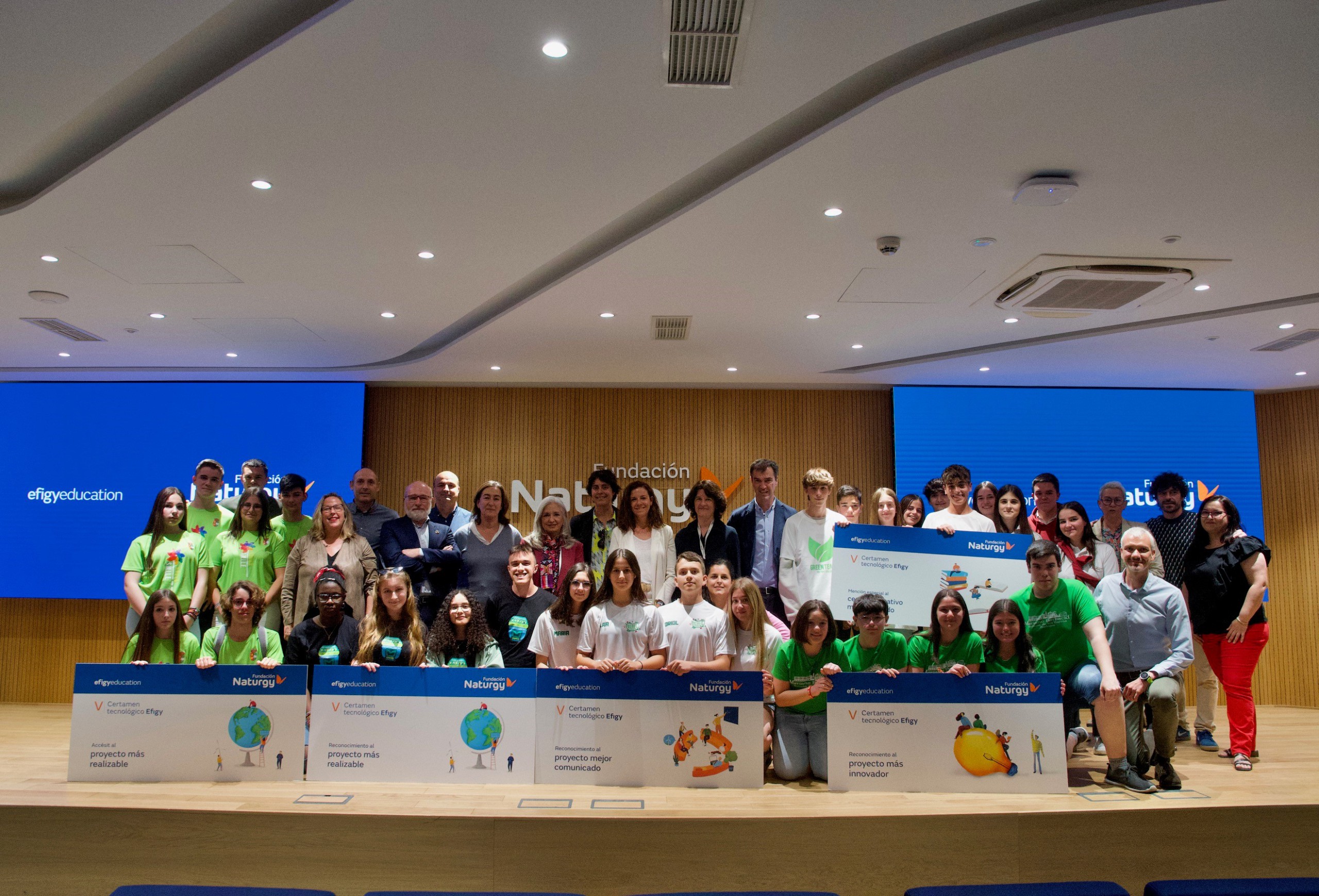After five years, the Naturgy Foundation Efigy Technology Competition has become a well-established event recognising the five best school energy efficiency projects in Spanish schools
Five schools in Navarre, Extremadura, Catalonia, the Balearic Islands and Andalusia were rewarded by a jury of experts made up of representatives from the Just Transition Mechanism, the Spanish National Research Council, the Spanish Foundation for Science and Technology (FECYT), Naturgy and the Naturgy Foundation, at a gala event held today in Madrid.

Five schools in Navarre, Extremadura, Catalonia, the Balearic Islands and Andalusia have won the fifth Efigy Technology Competition, in which the Naturgy Foundation challenges 3rd- and 4th-year secondary school pupils from all over Spain to enter energy efficiency and innovation projects that help improve the environmental health of our planet. The purpose of the energy company foundation’s initiative, now in its fifth year, is to promote STEM professions and energy efficiency values among young people.
The winning projects propose initiatives relating to solar energy, natural resources, the construction of self-generators, energy savings, and reducing light pollution.
Today, young people from all over Spain shared and explained their school projects at an event held in Madrid. The winners were announced at a gala event held later, presented by journalist Patricia Fernández de Lis, El País’ Science, Technology and Health editor-in-chief.
The jury — made up of representatives of the Fair Transition Mechanism (ITJ), the Spanish National Research Council (CSIC), the Spanish Foundation for Science and Technology (FECYT), Naturgy and the Naturgy Foundation— also took part in the event, evaluating the participants’ innovative ideas in the field of energy, the originality of their projects based on empirical data and the resulting scientific-technological knowledge that would allow the winning projects to be developed.
The managing director of the Naturgy Foundation, María Eugenia Coronado, congratulated all the participants in this fifth edition of the competition for the creativity and applicability of all the projects submitted, highlighting “the quality of the proposals and dedication of both pupils and teachers. The success of the Efigy Technology Competition is due to the efforts of the schoolchildren who submit innovative technological projects that are so necessary to continue increasing energy efficiency each year.” She said that “the goal of this initiative is to create a learning environment that favours access to specialised knowledge and to encourage technological vocations, so that together we can guarantee a fair energy transition and make progress with the sustainability of the planet” .
More than 1,000 third- and fourth-year secondary school students in eleven autonomous regions participated in the fifth Efigy Technology Competition: Andalusia, Asturias, the Community of Madrid, the Valencian Community, Catalonia, Extremadura, Galicia, the Balearic Islands, the Canary Islands, La Rioja and Navarre.
The winning projects
Pupils from Port d’Alcúdia Secondary School (the Balearic Islands) won the ‘Most feasible project’ category. Their entry – “Baking Energy” – consisted of a feasibility study for building a solar oven with a thermopile to obtain energy.
A group of schoolchildren from the Mariano Barbacid Secondary School (Solana de Barros, Badajoz, Extremadura), won the ‘Most Innovative Project’ category with their project ‘New Step Energy, The Electricity in your Feet”, Their project consisted of creating a prototype for transforming mechanical energy generated when we walk into energy, and its subsequent storage.
The ‘Best Communications’ category was won by the Roquetes Secondary School in Roquetes, Tarragona. The pupils’ “NameE” project was a proposal to create a microbial fuel cell to use moisture in the air that condenses on the outside of blocks of flats and collected rainwater.
The prize for the ‘Most involved’ project went to Port d’Alcúdia Secondary School in Alcúdia in the Balearic Islands. Their “Eolo” project was a method for making the school energy self-sufficient and sustainable by designing and building a prototype wind turbine using reusable and recyclable material.
The jury also presented a special recognition award to the pupils from Aurantia Secondary School (Benahadux, Almería, Andalusia) in the ‘Most achievable project’ category for their ‘SMILE – Smart Makers Invest Less Energy’ project, an electricity saving proposal that uses intelligent street lights to reduce light pollution and the economic and energy cost of unnecessary lighting.
As in the four previous contests, the public could vote for their favourite project in this year’s competition via the Naturgy Foundation’s social networks. The videos of the semi-finalist projects were watched almost 32,700 times and received 9,000 likes.
This year, the expert jury was made up of Ana Belén Sánche, Fair Transition Advisor to the Vice-President and Minister for the Ecological Transition and Demographic Challenge; Belén Gilarranz, head of institutional relations at FECYT, which comes under the Ministry of Science and Innovation; Miguel A. Peña, Research Scientist at the CSIC Institute of Catalysis and Petrochemistry; Núria Rodríguez, director of Environment and CSR at Naturgy; and Manuel Calvo, head of Energy and Environment at the Naturgy Foundation.
Share